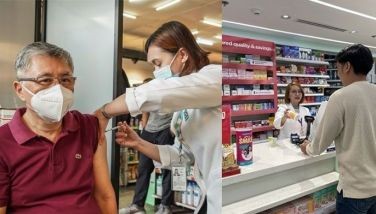Promoting commuter safety
September 26, 2005 | 12:00am
"Five o clock. Get to the FX terminal quickly before you become the 50th person in line! You can‘t afford to be late. Go!"
This is the refrain playing in the mind of most employees needing to get home as quickly and as comfortably as possible. Many of these workers do not have cars. The rest are either restricted by vehicle color coding or are simply forced by high fuel prices and parking fees to join the plight of the commuting masses. Everyday suffering includes an exhausted mind or body, heavy traffic, long line in the terminals and cramped PUJs. And if it rains, people get wet and some get sick.
The penance doesn’t stop there. I got surprised when I learned about my secretary falling prey to snatchers while being in one of those terminals. Lack of security now adds to the litany of woes. But is this the regular fare? Asking around the office made me discover that the people I work with, in one way or another, have experienced being held up or victimized by pickpockets. So much for that basic need for safety.
This brings me to thinking. Traffic is difficult to solve. We can no longer widen the roads. Soaring fuel prices is a global dilemma that proves to have no practical solution at present. Rains fall. We can’t do anything about it. But the security problem? It may have a doable solution.
Some malls assign security guards to record taxi plate numbers and the time the cars leave.The information is intended to be used in the investigation process in case a crime would be committed. Goodwill noted. However, there might be better ways to deter bad elements.
Reality TV gives us a clue. Cameras everywhere, watching every person and every move.
For years now, shop owners have used a technology called "closed circuit television"or CCTV to prevent petty thievery in their shops. I have done this personally because I operate a few shopping centers myself. Once we installed the surveillance cameras, the petty thievery stopped.
This same technology can extend outside the shops. The CCTV can monitor 24 hours a day, seven days a week, covering the most vulnerable areas, including the shopping sidewalks, vehicle thoroughfares, parking lots and transport terminals.
Many European countries now employ public CCTV systems. The United Kingdom sets a good example by installing more than 40,000 cameras all around its cities. The presence of CCTVs dissuades people of ill will, from simple pickpockets to professional terrorists. And if unfortunately, something bad isn’t prevented, investigation will not be as difficult because record will show tracks that may lead to the suspects.
How much do you think the PNP spends for an investigation? How much do you think these high-tech unblinking watchdogs are? If security cameras are indeed effective, the question then boils down to cost-efficiency. If even some affordable mobile phones now have built-in cameras; if Internet video cams sometimes cost less than a P1,000, how expensive can CCTVs be?
Most black and white models of mini or on-board cameras from mainland China presently sell for between $9 and $15. Color models cost $13 to $25. These are low-end security cameras that are used in good and constant light conditions.
There are more expensive CCTVs with higher resolutions, better lenses, and pan, tilt, and zoom options. They are usually used in groceries, hotels, and other business establishments. A complete CCTV system with 20 to 30 cameras should cost around P200,000 to P250,000. For transport terminals, however, the less expensive ones will do.
If cameras will be installed who’s going to shoulder the expense? The good news is that it may not necessarily be the national or local government. They have so many other concerns that will benefit the common good that are really worth spending for. The alternative then is the business sector.
For example, shopping centers and other businesses near the transport terminals can fund the CCTVs. Concerned citizens and communities longing to have a significant contribution to the nation can also pitch in.
It does not even have to be as expansive as that of the U.K. Installing CCTVs in major transport terminals such as Cubao, Shaw Blvd., and Landmark will already make a big difference.
Although this may not be the best solution, it is something to think about. While it is not foolproof, it reduces crime and is helpful in prosecuting individuals caught in the act of committing a crime. More people will be encouraged to report crimes. This should then boost confidence in police authorities and foster close cooperation within communities.
The Philippines is struggling with political divisiveness resulting in economic instability and worsening poverty. When people get hungry, when people get angry, cities invite more crimes. Let’s cut the long list of suffering for the Filipino. Digital surveillance, through the help of government or private entities, gives a simple and efficient solution to increase security in our communities. I dearly hope that at least, we can spare the Filipino commuter..
For comments and inquiries, you can email us at [email protected] or [email protected]
This is the refrain playing in the mind of most employees needing to get home as quickly and as comfortably as possible. Many of these workers do not have cars. The rest are either restricted by vehicle color coding or are simply forced by high fuel prices and parking fees to join the plight of the commuting masses. Everyday suffering includes an exhausted mind or body, heavy traffic, long line in the terminals and cramped PUJs. And if it rains, people get wet and some get sick.
The penance doesn’t stop there. I got surprised when I learned about my secretary falling prey to snatchers while being in one of those terminals. Lack of security now adds to the litany of woes. But is this the regular fare? Asking around the office made me discover that the people I work with, in one way or another, have experienced being held up or victimized by pickpockets. So much for that basic need for safety.
This brings me to thinking. Traffic is difficult to solve. We can no longer widen the roads. Soaring fuel prices is a global dilemma that proves to have no practical solution at present. Rains fall. We can’t do anything about it. But the security problem? It may have a doable solution.
Some malls assign security guards to record taxi plate numbers and the time the cars leave.The information is intended to be used in the investigation process in case a crime would be committed. Goodwill noted. However, there might be better ways to deter bad elements.
Reality TV gives us a clue. Cameras everywhere, watching every person and every move.
For years now, shop owners have used a technology called "closed circuit television"or CCTV to prevent petty thievery in their shops. I have done this personally because I operate a few shopping centers myself. Once we installed the surveillance cameras, the petty thievery stopped.
This same technology can extend outside the shops. The CCTV can monitor 24 hours a day, seven days a week, covering the most vulnerable areas, including the shopping sidewalks, vehicle thoroughfares, parking lots and transport terminals.
Many European countries now employ public CCTV systems. The United Kingdom sets a good example by installing more than 40,000 cameras all around its cities. The presence of CCTVs dissuades people of ill will, from simple pickpockets to professional terrorists. And if unfortunately, something bad isn’t prevented, investigation will not be as difficult because record will show tracks that may lead to the suspects.
How much do you think the PNP spends for an investigation? How much do you think these high-tech unblinking watchdogs are? If security cameras are indeed effective, the question then boils down to cost-efficiency. If even some affordable mobile phones now have built-in cameras; if Internet video cams sometimes cost less than a P1,000, how expensive can CCTVs be?
Most black and white models of mini or on-board cameras from mainland China presently sell for between $9 and $15. Color models cost $13 to $25. These are low-end security cameras that are used in good and constant light conditions.
There are more expensive CCTVs with higher resolutions, better lenses, and pan, tilt, and zoom options. They are usually used in groceries, hotels, and other business establishments. A complete CCTV system with 20 to 30 cameras should cost around P200,000 to P250,000. For transport terminals, however, the less expensive ones will do.
If cameras will be installed who’s going to shoulder the expense? The good news is that it may not necessarily be the national or local government. They have so many other concerns that will benefit the common good that are really worth spending for. The alternative then is the business sector.
For example, shopping centers and other businesses near the transport terminals can fund the CCTVs. Concerned citizens and communities longing to have a significant contribution to the nation can also pitch in.
It does not even have to be as expansive as that of the U.K. Installing CCTVs in major transport terminals such as Cubao, Shaw Blvd., and Landmark will already make a big difference.
Although this may not be the best solution, it is something to think about. While it is not foolproof, it reduces crime and is helpful in prosecuting individuals caught in the act of committing a crime. More people will be encouraged to report crimes. This should then boost confidence in police authorities and foster close cooperation within communities.
The Philippines is struggling with political divisiveness resulting in economic instability and worsening poverty. When people get hungry, when people get angry, cities invite more crimes. Let’s cut the long list of suffering for the Filipino. Digital surveillance, through the help of government or private entities, gives a simple and efficient solution to increase security in our communities. I dearly hope that at least, we can spare the Filipino commuter..
For comments and inquiries, you can email us at [email protected] or [email protected]
BrandSpace Articles
<
>
- Latest
- Trending
Trending
Latest
Trending
Latest
Recommended
September 28, 2024 - 12:00am
September 26, 2024 - 12:00am


























